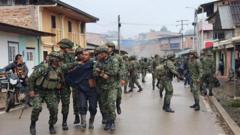How Did the Colombian Army Rescue 57 Soldiers from Local Captivity?

Colombia's Military Operation: A Successful Rescue of 57 Soldiers
In a remarkable display of military precision and strategic planning, Colombian authorities have successfully freed 57 soldiers held captive by local inhabitants in the mountainous region of Cauca. This operation, dubbed "Operation Justice," was executed without a single shot fired, showcasing the Colombian military's commitment to safeguarding its personnel amidst a complex landscape dominated by armed groups and illegal activities. In this comprehensive article, we will explore the context surrounding this incident, the implications of such kidnappings, and the broader challenges faced in regions plagued by drug trafficking and armed conflict.
The Context of the Kidnapping
The kidnapping incident occurred shortly after the arrest of a suspected member of the EMC (Ejército de Liberación Nacional) rebel group on a Saturday. As Colombian soldiers attempted to airlift the suspect from the mountainous area, they were unexpectedly surrounded by over 100 local inhabitants. The situation quickly escalated when a second military unit was taken captive the following day by an even larger group. This incident marks one of the largest mass detentions of military personnel in recent history, raising alarms regarding the security of soldiers operating in high-conflict areas.
Background on the EMC Rebel Group
The EMC is known for its involvement in cocaine production and trafficking, which has plagued Colombia for decades. The group operates in various regions, particularly in Cauca, where the geography provides both cover and strategic advantages for illicit activities. Understanding the dynamics of this rebel group is crucial to grasping the motivations behind the recent kidnapping and the broader implications for Colombian society.
Local Perceptions and Reactions
The locals involved in the kidnapping reportedly acted on orders from the EMC, viewing the presence of military personnel as a threat to their livelihoods. In regions where more than 90% of the inhabitants rely on coca cultivation, tensions between the military and local communities can escalate quickly. The Colombian military's presence often symbolizes a direct challenge to the traditional economic systems that many locals depend on, leading to a cycle of conflict and retaliation.
The Military Response: Operation Justice
In response to the kidnappings, Colombian Defence Minister Pedro Sánchez announced "Operation Justice," which involved the rapid deployment of heavily armed military reinforcements to the region. The operation aimed not only to rescue the soldiers but also to restore order and assert control over a volatile area. With a calculated approach, the military managed to apprehend 20 individuals involved in the hostage-taking without engaging in armed conflict.
Strategic Planning and Execution
The success of Operation Justice can be attributed to meticulous planning and intelligence gathering. Military officials had to assess the situation carefully, considering the potential for violence and the need for a swift resolution. By choosing to avoid direct confrontation, the Colombian military displayed a strategic understanding of the local dynamics, emphasizing the importance of negotiation and tactical engagement in such sensitive situations.
Implications of the Kidnapping for Colombian Society
The kidnapping of soldiers by locals is not an isolated incident but rather part of a larger pattern of conflict in Colombia. Over the years, members of the security forces have been detained in various regions, often leading to negotiations with humanitarian groups for their release. However, the refusal of the captors to engage in dialogue during this incident indicates a shift in tactics that could signal deeper problems in the relationship between the military and local communities.
The Role of Cocaine Production in Armed Conflict
Coca cultivation is a significant factor in the ongoing violence in Colombia. With many communities relying on the coca plant for economic survival, the presence of military forces is frequently met with hostility. As the Colombian government seeks to combat drug trafficking, it must also address the underlying socio-economic issues that drive communities to support rebel groups like the EMC. This dual approach is essential for achieving long-term stability and peace in the region.
Humanitarian Concerns
The involvement of armed groups in local governance raises serious humanitarian concerns. As these groups often engage in extortion and violence, the safety and well-being of civilians are continually at risk. The heightened tensions resulting from military operations can exacerbate these vulnerabilities, leading to a dire cycle where communities are further alienated from the state.
The Future of Military Operations in Colombia
As the Colombian military continues to navigate the complexities of armed conflict and drug trafficking, the recent success of Operation Justice serves as a reminder of the delicate balance required in such operations. While military strength is essential in combating organized crime, fostering relationships with local communities is equally important. The future of military operations in Colombia will depend on a comprehensive strategy that integrates security, humanitarian considerations, and socio-economic development.
Building Trust with Local Communities
For the military to effectively operate in conflict-affected areas, building trust with local communities is paramount. Initiatives aimed at community engagement, education, and economic development can help alleviate tensions and reduce the likelihood of violent confrontations. By addressing the root causes of conflict, the Colombian government can work towards creating a more peaceful and stable society.
Conclusion
The rescue of 57 soldiers in Colombia highlights the intricate challenges faced by the military in conflict-prone regions. As the country grapples with the dual threats of armed groups and drug trafficking, understanding the dynamics at play is essential for creating effective strategies for peace and security. The success of Operation Justice demonstrates the importance of tactical planning and the need for a comprehensive approach that goes beyond military action. The path forward lies in fostering dialogue, building trust, and addressing the socio-economic issues that contribute to the cycle of violence.
As we reflect on the events surrounding this incident, one question lingers: How can Colombia effectively bridge the gap between military operations and community engagement to foster lasting peace and stability? #Colombia #MilitaryRescue #CocaineWar
FAQs
What is the EMC rebel group in Colombia?
The EMC (Ejército de Liberación Nacional) is a rebel group involved in drug trafficking and armed conflict in Colombia, particularly known for its involvement in coca cultivation and illegal mining.
Why was Operation Justice launched?
Operation Justice was launched in response to the kidnapping of 57 soldiers by locals in the Cauca region, aimed at ensuring their safe rescue without engaging in armed conflict.
What are the economic implications of coca cultivation in Colombia?
Coca cultivation serves as a primary source of income for many communities in Colombia, leading to complex relationships between locals and armed groups, as well as the military.
Published: 2025-06-24 13:38:09 | Category: world



